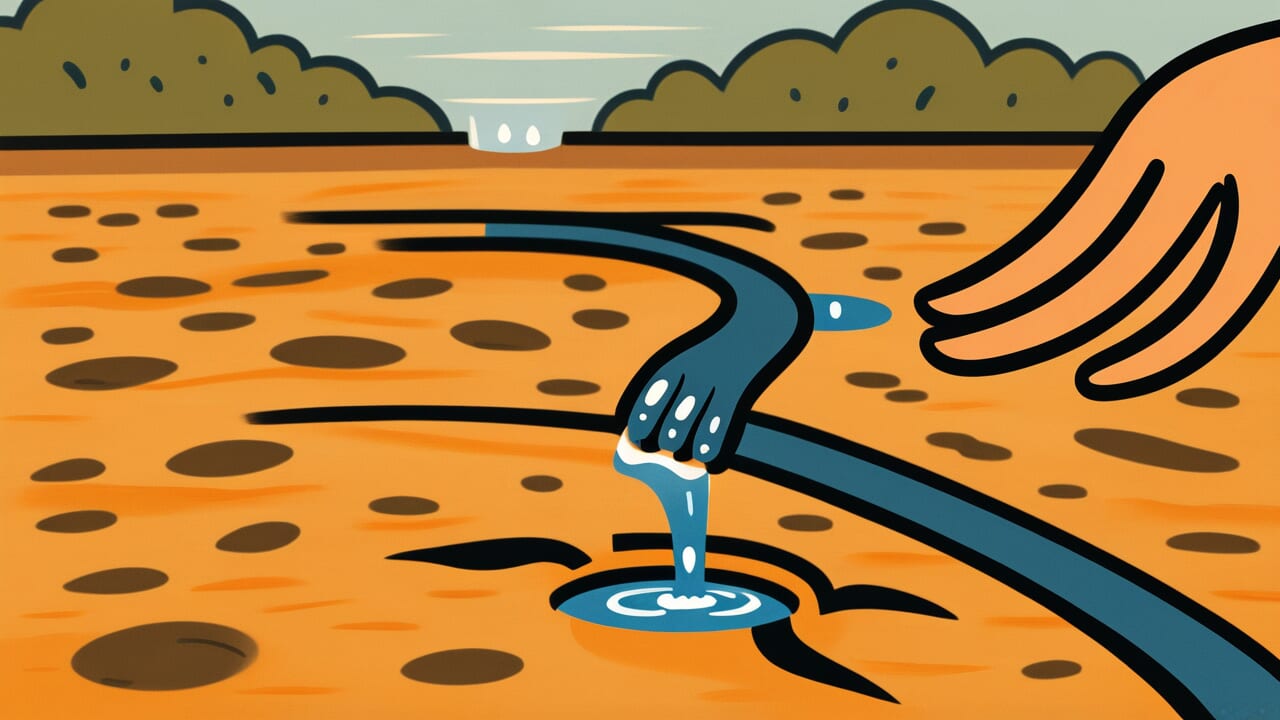How to Read “Water gathers in low places”
Hikuki tokoro ni mizu tamaru
Meaning of “Water gathers in low places”
“Water gathers in low places” means that people and things naturally gather around those who maintain a humble and modest attitude.
Just as water flows from high places to low places and collects there, trust, goodwill, information, and support naturally gather around people who are humble and modest.
People who don’t act arrogant or superior, but instead interact with others from a low position, actually end up gaining more. This proverb expresses a fundamental truth about human relationships.
This saying is often used when talking about leadership and popularity. It’s also quoted when teaching young people about the importance of humility.
Even in modern society, people who listen well and maintain a humble attitude gain more collaborators and supporters than those who are too self-assertive. This truth hasn’t changed.
Origin and Etymology
No clear written record of this proverb’s origin seems to exist. However, based on its structure, it likely contains the wisdom of ancestors who observed water’s natural properties.
Water flows from high places to low places. It eventually gathers and collects in the lowest spots. This is a natural law that everyone knows as a physical principle.
Water flowing from mountains goes to valleys, from valleys to flatlands, and finally collects in the lowest hollows and ponds.
This proverb likely came from applying this natural phenomenon to human society. Japan has long had a culture that values humility and modest behavior as virtues.
The importance of not being arrogant and maintaining a low posture is thought to be influenced by Buddhist and Confucian thought.
What’s interesting is that this proverb isn’t just a moral lesson. It’s based on actual observations of human relationships.
People naturally gather around humble, modest individuals rather than arrogant ones. Information and support flow to them naturally.
The cleverness of this proverb lies in expressing this social phenomenon through the metaphor of water flow, something everyone can understand.
Usage Examples
- That senior doesn’t act superior and is polite to everyone, so like “water gathers in low places,” people naturally gather around them
- His success wasn’t just talent—as “water gathers in low places” shows, his humble attitude attracted many collaborators
Universal Wisdom
The proverb “Water gathers in low places” contains a deep truth about human society. Why do people and things gather around humble individuals?
It’s because humans instinctively seek “places where they feel safe.” When we’re near domineering or arrogant people, we’re constantly forced to feel tense.
On the other hand, beside humble and modest people, our hearts relax and we can be ourselves. Just as water naturally flows into low places, human hearts are drawn to places where they feel comfortable.
What’s even more interesting is the “receptivity” that humility possesses. Low places can receive water, but high places cannot.
Similarly, humble people can openly accept others’ opinions, advice, and information. This receptivity creates a positive cycle that attracts even more people and information.
This proverb has been passed down for so long because our ancestors learned from experience a paradoxical truth. True influence comes not from looking down from high places, but from receiving in low places.
Real influence doesn’t come from suppressing others with force, but from attracting them with humility. This is timeless wisdom about understanding human nature.
When AI Hears This
Water gathering in low places is energy minimization through gravity. Interestingly, the flow of information and wealth follows similar physical laws. But there’s a crucial difference.
Water tries to spread completely evenly. Information and wealth, however, tend to concentrate further in “places where they’ve already accumulated.”
This relates to what information theory calls “path dependence.” For example, information on the internet concentrates on easily accessible sites.
Top search results get clicked more easily, and the more they’re clicked, the higher they rank. In other words, information flow has friction, and the path with least friction is “where information has already gathered.”
Wealth works the same way. Investment opportunities and connections flow preferentially to places where capital already exists.
But here’s something interesting: physical water flow has a “capacity limit.” When a cup fills up, water overflows and seeks the next low place.
Applying this physical law to human society, arrogant people who make themselves look superior are perceived as “already full cups.” Information and opportunities stop flowing to them.
Meanwhile, a humble attitude sends a signal of being “a low place with room to spare.” Information and cooperation naturally gather from the surroundings.
The law of entropy increase predicts “diffusion,” but in information systems, “concentration” occurs instead. This proverb brilliantly captures both properties.
Lessons for Today
Modern society tends to emphasize self-promotion and self-assertion. On social media, broadcasting your success and achievements has become normal. Standing out seems to be valued.
However, this proverb shows us a different path.
People with real influence and trust are actually humble. They don’t show off themselves—they listen to others. They don’t force their opinions but respect others’ thoughts.
This attitude ultimately attracts many people and builds rich human relationships.
Why not relax your shoulders a bit? You don’t need to appear perfect. You don’t need to pretend you know everything.
When you don’t understand something, you can honestly say “please teach me.” When you make a mistake, you can apologize with “I’m sorry.”
This kind of humility will gather people around you and bring you true richness. Maintaining a low posture isn’t weakness at all.
It’s the strength to receive many things.



Comments